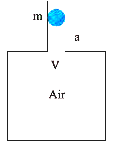No physicist has ever “seen” an electron. Yet, all physicists believe in the existence of electrons. An intelligent but superstitious man advances this analogy to argue that ‘ghosts’ exist even though no one has ‘seen’ one. How will you refute his argument ?Solution in Gujrati
Step by step video & image solution for No physicist has ever “seen” an electron. Yet, all physicists believe in the existence of electrons. An intelligent but superstitious man advances this analogy to argue that ‘ghosts’ exist even though no one has ‘seen’ one. How will you refute his argument ? by Physics experts to help you in doubts & scoring excellent marks in Class 11 exams.
Updated on:21/07/2023Topper's Solved these Questions
Similar Questions
An air chamber of volume V has a neck area of cross section a into which a ball of mass m just fits and can move up and down without any friction (Fig.14.27). Show that when the ball is pressed down a little and released , it executes SHM. Obtain an expression for the time period of oscillations assuming pressure-volume variations of air to be isothermal [see Fig. 14.27].

View SolutionDuring rolling, the force of friction acts in the same direction as the direction of motion of the CM of the body.
View SolutionNo physicist has ever "seen" an electron, yet, all physicists believe in existence of electrons . An intelligent but superstitious man advances this analog to argure that 'ghosts' exist even though no one has "seen" one . How will you refute his argument ?
View SolutionNo physicist has ever "seen" an electron, yet, all physicists believe in existence of electrons . An intelligent but superstitious man advances this analog to argure that 'ghosts' exist even though no one has "seen" one . How will you refute his argument ?
View SolutionWhich one has a real existence
View SolutionHow can you explain the existence of analogous organs ?
View Solutionकिसी भी भौतिक विज्ञानी के इलेक्ट्रॉन के कभी भी दर्शन नहीं की हैं परंतु फिर भी भौतिक विज्ञानियों का इलेक्ट्रॉन के अस्तित्व में विश्वास है। कोई बुद्धिमान, परंतु अंधिविश्वासी व्यक्ति इस तुल्यरूपता को इस तर्क के साथ आगे बढ़ाता है कि यद्यपि किसी ने देखा नहीं है, परंतु भूतों का अस्तित्व है। आप इस तर्क क खंडन किस प्रकार करेंगे।
View Solutionकिसी भी भौतिक विज्ञानी ने इलेक्ट्रॉन के कभी भी दर्शन नहीं किये है, परन्तु फिर भी सभी भौतिक विज्ञानियों का इलेक्ट्रॉन के अस्तित्व में विश्वास है। कोई बुद्धिमान परन्तु अंध विश्वासी व्यक्ति इसी तुल्यरूपता को इस तर्क के साथ आगे बढ़ाता है की यधपि किसी ने 'देखा' नहीं है परन्तु 'भूतो' का अस्तित्व है। आप इस तर्क का खंडन किस प्रकार करेंगे?
View Solutionकिसी भी भौतिक विज्ञानी ने इलेक्ट्रान के कभी भी दर्शन नहीं किए हैं। परन्तु फिर भी सभी भौतिक वैज्ञानिक का इलेक्ट्रान के अस्तित्व में विश्वास है। कोई बुद्धिमान परन्तु अंधविश्व व्यक्ति इसी तुल्यरूपता को इस तर्क के साथ आगे बढ़ाता है कि यद्यपि किसी ने देखा' नहीं है परन्तु 'भूतों' का अस्तित्व है | आप इस तर्क का खंडन किस प्रकार करेंगे?
View SolutionName the physicists who for the first time verified the wave nature of electrons.
View SolutionNo physicist has ever "seen" an electron, yet, all physicists believe in existence of electrons . An intelligent but superstitious man advances this analog to argure that 'ghosts' exist even though no one has "seen" one . How will you refute his argument ?
View SolutionNo physicist has ever “seen” an electron. Yet, all physicists believe in the existence of electrons. An intelligent but superstitious man advances this analogy to argue that ‘ghosts’ exist even though no one has ‘seen’ one. How will you refute his argument ?
View SolutionHow can you explain the existence of analogous organs?
View SolutionNo physicist has ever "seen" an electron. Yet, all physicists believe in the existence of electrons. An intelligent but superstitious man advances this analogy to argue that 'ghosts' exist even though no one has 'seen' one. How will you refuse his argument ?
View SolutionNo physicist has ever seen an atom. Yet all physicist believe in the existence of atoms. An intelligent but superstitions man advances this analogy to argue that ghosts exist even though no one has seen one. How will you refuse his argument?
View Solution
